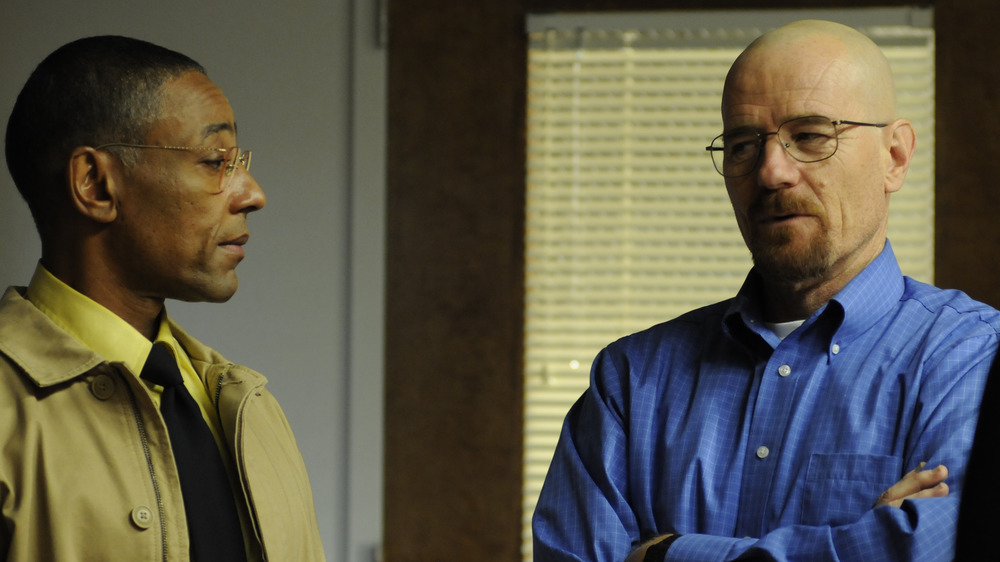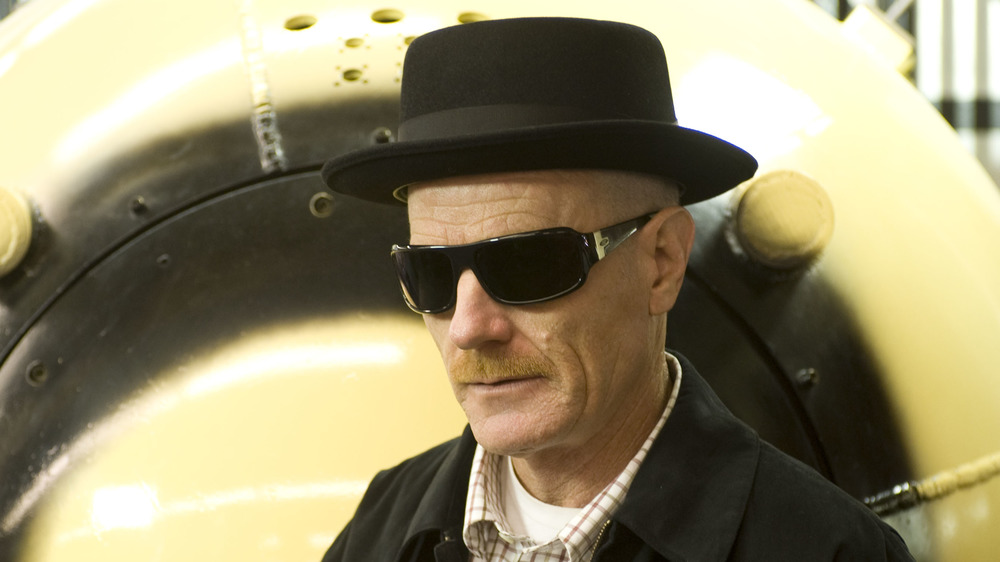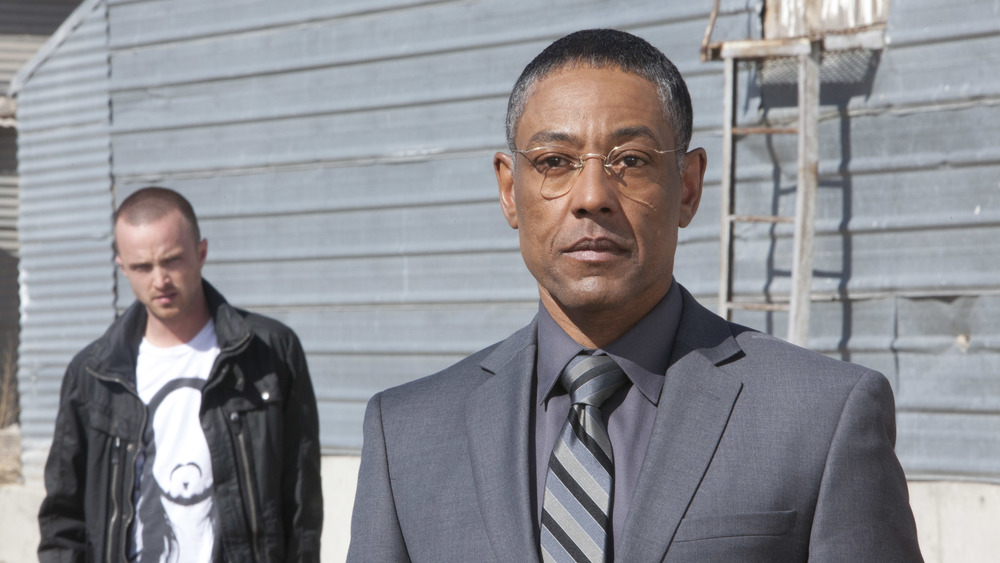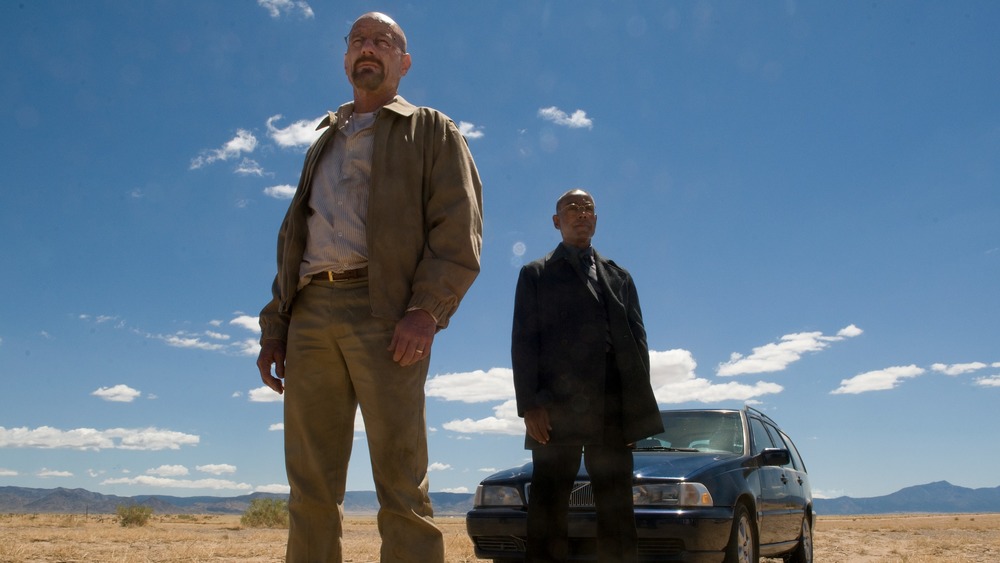The Character Breaking Bad Fans Think Really Caused Walt And Gus' War
For a little while on Breaking Bad, Gustavo Fring (Giancarlo Esposito) and Walter White (Bryan Cranston) had a good thing going. Walt the chemist made super high-quality crystal meth for Gus the kingpin, drug users all over the world loved the product, and Walt and Gus made big money. But it went bad, and eventually ended up with – spoiler alert – Walt killing Gus with a bomb in a nursing home.
AMC's acclaimed crime thriller ended in 2013, but fans are still thinking about who was responsible for Gus and Walt's business deal going bad. On the Breaking Bad subreddit r/breakingbad, user u/rochesterslim recently raised the question of whose fault it was that the relationship fell apart. "I can see arguments for Gus, Walt, Jesse hell maybe even Mike," the Redditor wrote.
In the replies, other Breaking Bad fans made cases for who they think was most responsible for the collapse.
Walter White blew it up
Some fans blame Walt's paranoia and aggression for messing things up. A user from a now-deleted account laid out an argument that Walt ordering Jesse (Aaron Paul) to sell in Gus' territory led to Walt killing two rival dealers with his car to protect Jesse, who was going to kill the dealers for gang-initiating and then killing his girlfriend's 11-year-old brother Tomás (Angelo Martinez). This led to Gus deciding that Walt was too much of a liability and bringing in chemist Gale Boetticher (David Costabile) to learn from and eventually replace Walt; in turn, this pushed Walt to order Jesse to kill Gale, making himself indispensable to Gus. The resulting tense stalemate made Walt afraid that Gus would still kill him and Jesse, and so Walt felt he had to kill Gus first. "It all led back to Walt," the user concluded.
Another user, u/PowerfulRelax, said that Walt's inability to work with others was partially to blame. Long before he turned to a life of crime, Walt had been a cofounder of a technology company called Gray Matter, which he left due to a falling out with his partners (one of which could have changed his life). The company became very successful after Walt left, largely from using research that Walt had conducted. Walt always resented this. Walt had a long history of not getting along with people he worked with, and was driven by spite and bitterness.
But what about Gus?
Walter may have made some preemptive strikes, but he wouldn't have if Gus wasn't actually going to kill him, other fans argued. The brutal terms of the deal were always in Gus' favor, and maybe if Gus had actually treated Walt like a partner, things would have been different. "There was never a relationship," user u/ChunkyForesight wrote. "Walt was going to be dealt with in one way or another after Gale got the cook down."
User u/expiredmemes1 wrote that Gus didn't fully understand how emotionally driven Walt was, and thought that eventually Walt would cut ties with the unreliable Jesse. But Walt remained loyal to Jesse until the bitter end. Gus should have accepted Walt killing Gus' two child-murdering dealers on Jesse's behalf as a cost of doing business or even a gift, since it's bad business to have men like that on the payroll and Gus didn't allow children to be used as dealers anyway. Gus just didn't handle Walt and Jesse correctly.
Walt's fault, but for a good reason
User u/AllPatriotism had a more nuanced take on the situation that accounted for Gus' cruelty and failure to fully understand Walt, while still pinning the blame on Walt's "conscience" and loyalty to Jesse, which was a positive character trait but a bad business decision.
"When Jesse threatened to give him up if he ever got caught, Walt should have told Gus about the problem, who in turn would have taken out Jesse to protect his asset," u/AllPatriotism wrote. "Ditto when he learned of Jesse's plan to poison the dealers. Walt just wasn't a successful criminal by having a conscience. He got better at it later on, e.g. more ruthless, but again his sentimentality for people eventually came back to bite him in the a**."
In the end, neither man was blameless in the situation, and each contributed to their downfall. We say they were bad guys who got what was coming to them.



